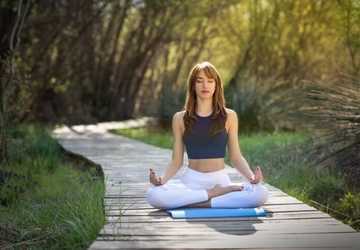fashion
In the contemporary, rapid-paced society, anxiety has become a frequent companion for numerous individuals. Modern life's constant hustle and bustle can leave us overwhelmed and stressed. You're not alone if you've ever been worrying about the future or ruminating on the past. Anxiety can be a challenging emotion to deal with, but there are effective ways to manage it.
One such approach is mindfulness. Practicing mindfulness methods can assist in alleviating anxiety and discovering a state of tranquility amidst life's turbulence. This article will explore the top 10 mindfulness techniques to help you regain control over your anxious mind.
Mindfulness Techniques for Reducing Anxiety
Anxiety has become a familiar companion in our fast-paced and often chaotic world. It creeps into our lives during stress, uncertainty, and even mundane day-to-day routines. However, it's essential to remember that anxiety, though natural, can be managed and reduced. One of the most effective tools in this endeavor is the practice of mindfulness. Mindfulness empowers us to be fully present in the moment, helping us detach from the overwhelming whirlwind of anxious thoughts and emotions. In this article, we'll delve into the top 10 mindfulness practices that effectively alleviate anxiety and bring back serenity and tranquility.

1. Deep Breathing
Deep breathing, a straightforward yet potent mindfulness method, can swiftly alleviate anxiety. When you are in overwhelming emotions, briefly pause and direct your attention towards your breath. Inhale deeply via your nostrils, allowing air to infuse your lungs, followed by a gradual exhalation through your mouth.
While you engage in this rhythmic breathing, focus on the tactile experience of the air flowing into and out of your body. Deep breathing can soothe the nervous system, reduce heart rate, and restore emotional equilibrium.
2. Body Scan Meditation
Body scan meditation is a practice that promotes mindfulness by prompting you to focus on your body and the tactile sensations you are currently feeling. Lie down or sit comfortably, close your eyes, and start at your toes.
Slowly work your way up through your body, noticing any areas of tension, discomfort, or pain. This practice increases your awareness of bodily sensations, helps you release physical tension, and reduces anxiety.
3. Mindful Walking
Sometimes, the best way to reduce anxiety is to step away from the situation causing it. Take a walk in nature, and practice mindful walking. Pay attention to the feeling of the ground beneath your feet, the sounds of nature, and the sensation of the air on your skin.
Mindful walking can help you shift your focus from anxiety-inducing thoughts to the present moment, bringing peace and calm.
4. Visualization
Visualization is a powerful mindfulness technique that creates a mental image of a peaceful and anxiety-free place. Please take a moment to envision yourself in a serene location, be it a sandy beach, a lush forest, or a snug cabin nestled in the mountains.
As you visualize this place, engage all your senses – see the colors, hear the sounds, smell the scents, and feel the textures. This technique can transport your mind to a more peaceful state, reducing anxiety and providing a mental escape.
5. Journaling
A mindfulness journal is an excellent way to explore your thoughts and feelings and gain insight into your anxiety triggers. Please write down your worries, fears, and anxieties and the situations or events that lead to them. Reflect on your journal entries and look for patterns or recurring themes.

This practice allows you to distance yourself from your anxious thoughts, making it easier to process and reduce anxiety over time.
6. Mindful Eating
The way we eat can significantly impact our mental state. Practicing mindful eating entails remaining entirely present and aware during the act of consuming your food. Pay attention to the taste, texture, and smell of your food. Chew slowly and savor each bite. This practice can help you establish a healthier relationship with food and reduce anxiety associated with overeating or emotional eating.
7. Guided Meditation
Guided meditation is an excellent mindfulness technique for reducing anxiety, especially if you're new to meditation. Countless guided meditation apps and recordings cover various themes and durations. Choose one that resonates with you, and let the soothing voice guide you through a meditation session. Guided meditations can help you relax, focus, and release anxious thoughts.
8. Gratitude Practice
Focusing on gratitude is an effective way to shift your perspective and reduce anxiety. Start or end your day by listing things you're grateful for. These can be simple, everyday things like a good cup of coffee or a friendly conversation. Recognizing and appreciating the positive aspects of your life can help reduce anxiety by promoting a more optimistic outlook.
9. Progressive Muscle Relaxation
Progressive muscle relaxation is a mindfulness method that encompasses the deliberate contraction and release of every muscle group in your body, one at a time. Engaging in this activity aids in relieving physical tension while simultaneously producing a soothing impact on your mental state. As you work through your body, notice the difference between tension and relaxation. This increased awareness of physical sensations can translate into reduced anxiety.
10. Mindful Smartphone Use
In today's digital age, our smartphones can be both a source of information and a cause of anxiety. Mindful smartphone usage entails being aware of the manner and timing of your device usage.
Restrict screen time, establish personal boundaries, and avoid the constant compulsion to check your social media or email accounts. You can create a more peaceful, anxiety-free digital environment by reducing distractions and information overload.
Conclusion
Anxiety is a natural response to life's challenges but doesn't have to control your well-being. Mindfulness techniques offer effective ways to reduce anxiety and regain a sense of calm and control. Whether you choose deep breathing, body scan meditation, mindful walking, or any other techniques mentioned, the key is to practice regularly.
By incorporating mindfulness into your daily life, you can transform how you respond to anxiety and build resilience against its effects. Remember that reducing anxiety is a journey; these techniques are tools to help you along the way. Start with one or two practices that resonate with you; you'll find greater peace and tranquility over time.

